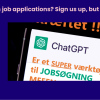Generic AI tools for adult learning
The number of digital applications based on artificial intelligence (AI) is growing rapidly. Although many of these programmes have not been designed specifically for the educational context, they are relevant and usable for adult learning. The CONEDU Association for Education Research and Media video entitled ‘Generative AI in Adult Learning 2023’ presents some useful AI tools and shows concrete use cases in education. The video provides tips on working with AI chatbots and explains which AI tools are used in adult learning.
Generic AI for educational purposes
This video is part of the CONEDU online course "EBmooc 2023: Your Update on Online Adult Education". Structured into 5 lessons, the course targets adult educators from different institutions, in different forms of employment and with different focal points: Adult educators in training/teaching/teaching, adult educators in education management/programme planning, adult educators in learning support and counselling. The EBmooc 2023 explores new resources and helpful recommendations on digital adult education. Participants will learn about new technologies and tools, deepen their media skills, explore innovative educational formats and gain an outlook on future digital trends.
How AI facilitates the work of teachers
More specifically, this video examines how Generative AI facilitates the work of teachers. Generic AI refers to AI applications that create text, images, music, videos or audio files on request. Currently, certain applications have become particularly useful in the field of adult learning:
- ChatGPT: AI-based chatbots such as ChatGPT can be used to identify ideas, plan workshops or design learning materials. A language model such as ChatGPT also provides useful suggestions for practical tasks or audit questions. Artificial intelligence can even produce presentations, teaching videos or whole courses. In practice, this has been implemented in MOOC Societech, which is free of charge and freely available.
- DeepL: Generic AI can also be used for translation. Here, DeepL delivers very useful results, especially for English-German. Fields of application are conceivable in language teaching. Deep-L Write is also a useful tool to optimise, shorten or summarise texts in a stylistic way. The application, like ChatGPT, corrects errors and proposes alternatives. A feature that could be particularly interesting for basic education is the possibility of translating a text into simple language.
- Tome is a tool for producing appealing PowerPoint presentations on fundamental topics. The results are good quality, they can delete or add slides, rephrase content themselves or with the help of AI, and also reshape the design or layout of the images. In this case, the images are generated by KI Dall-E.
Communicating properly with AI
In the context of large-language models, ‘prompting’ plays a crucial role, i.e. the specific instruction to AI. The more specific the request is formulated, the better the outcome. For example, a basic course on a topic could be envisaged as follows: “Create a tabular approach for an induction workshop on non-violent communication. The workshop will be held in person with 10 participants and will be interactive.” Such a request will provide a workable design that can be used well for further work.
Limitations of AI applications
All interactions with AI tools require a reflective approach. AI-generated content must always be examined or reworked, as AI knows no context or real world and is often overestimated. In addition to these limitations, generative AI – properly used – naturally offers great potential. The applications listed in the video have already proved their worth in the educational context and offer teaching staff in adult education in any case easier to work.
Digital skills resource details
Demonstration and discussion of current AI applications in an educational video with screencasts






